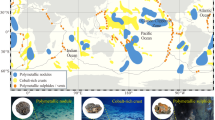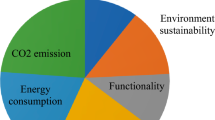Abstract
Many researchers have studied the ocean carbon cycle model trying to regulate the level of CO2 in atmosphere from viewpoint of quantification. Unlike other researches, this paper analyzes the conversion process of carbon element in the ocean from the qualitative viewpoint. There are many complex roles in the ocean carbon cycle, and it is hard to represent the case that an entity plays different role in different environment. An ontology technology Hozo role theory developed by Osaka University Mizoguchi Laboratory is proposed as a solution. The basic concepts and representation mode of Hozo role theory is introduced. The conversion process of ocean carbon cycle is abstracted and an ontology model using Hozo role theory is proposed. Instead of comprehensive common ontology construction method, we propose our own ontology development steps. Then an ontology about ocean carbon cycle is built in order to describe and share the basic knowledge of ocean carbon cycle. A knowledge base of material circulation is proposed based on the ontology. Its construction framework is described and some knowledge base query examples are also illustrated. Conclusions show that the role theory can effectively solve the problem of multirole description in ocean carbon cycle, and knowledge reasoning based on ontology is also effective.
Similar content being viewed by others
References
Abidi, S. R., Abidi, S. S. R., and Kwan, M., 2012. Modeling ocean data and E-Science Semantic Web Services using ontology framework. International Journal of Advanced Computer Science, 2(8): 280–286.
Cimiano, P., Buitelaar, P., McCrae, J., and Sintek, M., 2011. LexInfo: A declarative model for the lexicon-ontology inter-face. Web Semantics: Science. Services and Agents on the World Wide Web, 9(1): 29–51.
Gruber, T., 1993. A translation approach to portable ontology specifications. Knowledge Acquisition, 5(2): 199–220.
Guarino, N., 1992. Concepts, attributes and arbitrary relations: Some linguistic and ontological criteria for structuring knowledge bases. Data & Knowledge Engineering, 8(3): 249–261.
Kumazawa, T., Saito, O., Kozaki, K., Matsui, T., and Mizoguchi, R., 2009. Toward knowledge structuring of sustainability science based on ontology engineering. Sustainability Science, 4(1): 99–116.
Lang, J., and Lapata, M., 2011. Unsupervised semantic role induction via split-merge clustering. In: Proceedings of the 49th Annual Meeting of the Association for Computational Linguistics. Portland, Oregon, USA, 1117–1126.
Li, H. J., Li, J. Q., and Li, M., 2008. Research on modeling method of domain ontology. Computer Engineering and Design, 29(2): 381–384 (in Chinese with English abstract).
Mizoguchi, R., Sunagawa, E., Kozaki, K., and Kitamura, Y., 2007. The model of roles within an ontology development tool: Hozo. Applied Ontology, 2(2): 159–179.
Sarmiento, J. L., and Gruber, N., 2007. Ocean biogeochemical dynamics. Geological Magazine, 144(6): 1034–1034.
Tan, J., Shen, X. Y., and Li, Q. Q., 2009. Study on the feedback between ocean carbon circulation and global climate change. Journal of Meteorological Research and Application, 30(1): 33–36 (in Chinese with English abstract).
Thilagavathi, B., Raja, K., Das, B., Saravanakumar, A., Vijayalakshmi, S., and Balasubramanian, T., 2011. Heavy metal distribution in sediments of Muthupettai Mangroves, south east coast of India. Journal of Ocean University of China, 10(4): 385–390.
Xiong, J., Jiang, X. N., and Wang, A. M., 2012. Construction and application of marine ecology ontology based on role theory. Advance in Information Sciences and Service Sciences, 4(18): 132–138.
Xu, Y. F., Pu, Y. F., and Zhao, L., 2005. Advances in the studies of ocean carbon-cycle model. Advance in Earth Sciences, 20(10): 1106–1115.
Xu, Y. F., Zhao, L., and Li, Y. C., 2007. Ocean carbon cycle and marine ecosystem dynamics. Marine Environmental Science, 26(5): 495–500 (in Chinese with English abstract).
Yan, G. A., and Liu, Y. D., 2001. Aquatic ecosystems: Carbon cycle and as atmospheric CO2 sink. Acta Ecologica Sinica, 21: 827–833.
Yin, J. P., Wang, Y. S., Xu, J. R., and Sun, S., 2006. Adavances of studies on marine carbon cycle. Acta Ecologica Sinica, 26: 566–575 (in Chinese with English abstract).
Yuan, D., Xu, J. L., Liu, S. Y., and Liu, F., 2012a. Unsupervised semantic role labeling based on dependency parse. International Journal of Advancements in Computing Technology (IJACT), 4(19): 281–290.
Yuan, D., Xu, J. L., Xiong, J., Liu, S. Y., and Liu, F., 2012b. Semantic role induction based on multi-features. International Review on Computers and Software, 7(3): 1331–1336.
Author information
Authors and Affiliations
Corresponding author
Rights and permissions
About this article
Cite this article
Jia, H., Xiong, J., Xu, J. et al. Research and application of role theory in ocean carbon cycle ontology construction. J. Ocean Univ. China 13, 979–984 (2014). https://doi.org/10.1007/s11802-014-2249-6
Received:
Revised:
Accepted:
Published:
Issue Date:
DOI: https://doi.org/10.1007/s11802-014-2249-6




